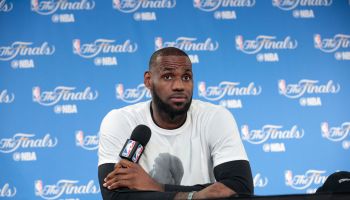LeBron James’ house was vandalized with a racial slur the day after he announced his intention to buy an NBA team. This is not a coincidence. The idea of Black ownership is downright terrifying to some Americans, considering the country’s racially charged history, and few have come as close to grabbing the brass ring as an NBA champ. In fact, LeBron’s unapologetic ambition and independence has been drawing hate since his days as a high school phenom.
From the moment LeBron was anointed basketball’s chosen one on a 2002 cover of Sports Illustrated, the Akron, Ohio native has consistently delivered on the immense hype that comes with being a prodigy. In his 13-year career, James has put up historic numbers both on the court and off— his seven straight finals appearances are just as historic as his nearly one-billion-dollar deal with Nike.
LeBron’s unapologetic ambition and independence has been drawing hate since his days as a high school phenom.
But none of that is more impressive than the thriving and scandal-free operation—run by childhood friends and millennial entrepreneurs—that LeBron assembled to run his Royal Court back when he was still too young to legally sip champagne. Neither the Miami Heat’s Big Three, nor Cleveland’s current super-team, has survived as long or defied as great of odds as LeBron’s infamous “posse,” a board that includes day-one homies, as well as world-renowned agent Rich Paul and power broker Maverick Carter, experienced deal makers who’ve helped King James push his empire to heights far beyond the rim.
As basketball fans clock the 32-year-old wunderkind’s inevitable athletic decline (he is still human, as far as we know) and rush to compare his on-the-court legacy to the legends of past generations, everyone from Wall Street to Hollywood should be preparing for the impact LeBron James and company will have after he retires from the game. Beyond the billions James stands to generate via playing salaries, endorsements and other ventures in the foreseeable future, his most lasting legacy may be as his generation’s most visible Black mogul.
In a recent interview with The Athletic, LeBron shared his post-NBA ambitions, telling reporters, “I will own a team someday. That’s my next thing.” He’s long toyed with the idea, but never directly announced his intentions to follow through. It’s likely the social and political events that have unfolded throughout this season have inspired an even greater mission for King James than defeating the Warriors— one that will reverberate beyond the walls of the Hall of Fame and barbershop debates about the GOAT.
It’s likely the social and political events that have unfolded throughout this season have inspired an even greater mission for King James
LeBron already owns a minority stake in popular European soccer team Liverpool FC, as well as equity in multiple media, tech and start-up ventures. And when he upgrades to NBA ownership, he won’t be the first player to have made the leap. But only LeBron has the leverage it will take to potentially turn the NBA into a player’s league, upending the plantation dynamics that still taint American professional sports.
“I’ve always loved putting people in a position of power,” revealed James when asked further about his ownership ambitions — and you don’t need to read too far between the lines to know he’s including his people, Black people. And nothing makes a racist more angry than a Black man seeking power and influence.
The recent hate crime committed at LeBron’s Los Angeles home, involving a vandal (or group of vandals) who spray painted the N-word across his garage door, proves how little America has changed since the days Magic Johnson and Larry Bird were sold as blatant symbols of America’s culture war. Indeed, LeBron has far more on his shoulders than just matching Michael Jordan’s six championship rings.
Rather than show the world how much the incident rattled him, LeBron showed the same composure, long-range vision and selflessness we’ve come to expect from him when discussing the hate crime. He said that he’s “okay” with what happened to him — as long as it continues a dialogue about how Black people are treated in society.
“No matter how much money you have, no matter how famous you are, no matter how many people admire you, being black in America is tough, and we got a long way to go,” he said.
When LeBron buys his team, he will have the power to deny Donald Sterling and Dan Gilbert access to the arena, and the league’s commissioner will answer to him. The NBA won’t be able to fine players for standing up for Black lives. And Phil Jackson will be remembered as a problematic, senile dinosaur.
Win or lose this year’s NBA Finals, LeBron James doesn’t have much more to prove on the basketball court moving forward. But he still has much bigger shots left to take. The new debate won’t be if LeBron is heralded the greatest basketball player of all time, it will be if he’s the greatest Black icon since Muhammad Ali. LeBron has managed to redefine the way the game is played and dominate his era in ways no one could have imagined when he first stepped on an NBA court at 18.
And no amount of graffiti will be able to stop him.
















